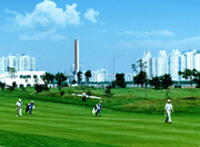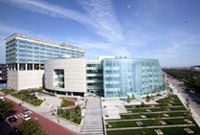| Tools: Save | Print | " target="_blank" class="style1">E-mail | Most Read |
| TEDA Promotes Recycling Economy |
| Adjust font size: |
|
The development of the recycling industry, a modern concept worldwide, occupies a prominent place on the work agenda of the Tianjin Economic and Technological Development Area (TEDA). The idea of recycling economy has been implemented in building the development area into an ecologically-sound industrial park. In the park, wastes produced by one enterprise are raw materials for another. Circulation and interdependence among enterprises means there will be no waste discharge. At present, developed countries such as Sweden, Canada and the United States are also building such industrial parks. Recycling industry is under construction in Chinese cities on trial bases. TEDA, which has been chosen by the State Administration of Environmental Protection from China's 49 State-level development zones as a demonstration ecological area, has made bold steps in building circulation chains among its enterprises. The area's first step in realizing a zero-discharge goal starts with its automobile industry, said Li Yong, director of TEDA. Waste recycling
Close links for waste recycling and regeneration among the enterprises is taking shape in the industry. Waste steel materials, leftover bits and pieces produced by Tianjin Toyota during the manufacturing process are purchased by a recycling company and a steel casting factory in the area. The waste is smelted into steel ingots and sold to Tianjin Toyota. The ingots will be used as raw material to make moulds. "Effective waste recycling has cut costs and, more importantly, reduced pollution," Li said. Now the number of auto-related enterprises has increased to 40 in the area. They include automobile assembling projects, parts suppliers and electronic products manufacturers. A new waste circulation system for auto disassembly, breaking up, retrieving and disposal is being built, Li said. Motorola is the largest foreign-funded enterprise in TEDA. The company has succeeded in reducing pollution brought by the packaging of mobile phones. At present, the phone producer makes soft packing for cellular phone boxes with recycled cardboard cases instead of foam plastics. Environmental improvement
Li attributed its success to a coal cinder and water recycling system in the area. Coal cinder produced by TEDA Thermal Power Company is a good material to build "green" land in the saline-alkaline area. The company consumes 120,000 tons to 170,000 tons of coal a year. The coal cinder is mixed with waste from a soda factory and abandoned bay silt in scientific proportion and method. It is then used for paving saline-alkaline land which will be developed into land for gardens and meadows. Apart from the area's central water treatment plant which treats 100,000 tons of waste water daily, the area has also built a center to handle waste water produced during the electroplating process. Mobile equipment can arrive at any time at the work sites to collect waste water and turn it into usable water. The Novozymes Group is the world leader in enzyme solutions. Its project in Tianjin, which is designed to turn out 2,000 tons of enzymes a day, is the largest enzyme solution producer in China. The product is widely used in detergent, textile, food and fodder industries. The company's waste water flows into a pool and is treated with scientific methods. After treatment, the water measures up to irrigation standard and is used free of charge on public "green" land and for cleaning roads. During the high water consumption period in summer, about 120 tons of treated water from the company is applied every day for public use. Enzyme products are processed out of sugar, starch, potato, mineral elements and nutrients in fermentation. Residues produced during the processing contain rich organic elements: nitrogen, phosphorus and other nutrients, all of which are good for land improvement. Tianjin Novozymes has also succeeded in producing Novogro30, an organic fertilizer, out of the residues. The company has provided over 40,000 tons of this fertilizer in the last six years for the development area to improve land quality. Economic success
Its GDP reached 44.5 billion yuan (US$5.36 billion) last year, a 25 per cent increase over 2002. TEDA's performance in the first half of 2004 is the best compared with those of the previous 10 years. Its GDP amounts to 25.96 billion yuan (US$3.13 billion), 27 per cent up from the same period last year. (China Daily, China.org.cn, August 4, 2004)
|
| Tools: Save | Print | " target="_blank" class="style1">E-mail | Most Read |
 |
| Related Stories |
|



